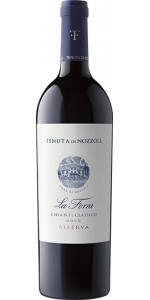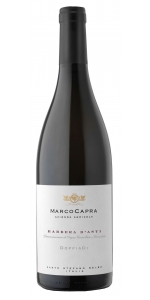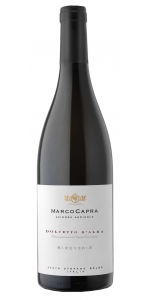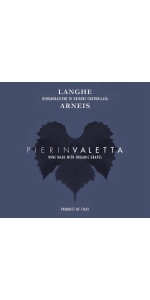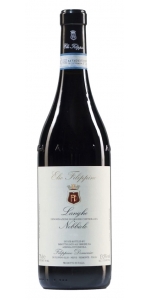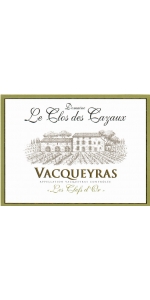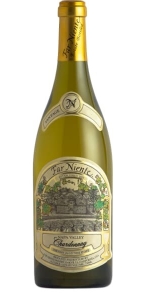Capra Marco Langhe Nascetta 2023
6 bottles with free shipping for: $180.00
12 bottles with free shipping for: $312.00
| BUY MORE! SAVE MORE! | ||||||||||||||||||||
|
| Country: | Italy |
| Region: | Piemonte |
| Winery: | Marco Capra Azienda Agricola |
| Grape Type: | Nascetta |
| Organic: | Yes |
| Vintage: | 2023 |
| Bottle Size: | 750 ml |
Marco Capra Langhe Nascetta is made from 100% Nascetta - 15 years old - 1.73 acres
Aged 6 months in stainless steel vats
The name "CONNA" is a sweet nickname after his wife Monica.
Bright straw yellow with greenish hues, with an intense and interesting perfume of grapefruit, apple and aromatic herbs. Floral, fresh, focused, good acidity. Refreshing and bright, full bodied with an aromatic persistence, it is savory and tasty on the palate with a smoothness that enhances the rich character of the wine
Altitude: 400 m above sea level.
Soil composition: lime and sand.
Plant density: 5000 vines / hectare.
Cultivation system: traditional Guyot.
Yield per hectare: 6 tons.
After a short period of maceration on skins, the grapes are soft pressed. The clear must obtained ferments slowly in stainless steel vats at a controlled temperature of 16-17°C. The wine spends a long period of time on the fine lees, with frequent “batonnage”
Ideal with apetizers, shellfish and other fish dishes.
The estate is located in Santo Stefano Belbo, on the Seirole
hill between the Langhe and Monferrato districts. The main resource of the area
has always been the cultivation of the vine: the particular geological
conformation of the soil and its microclimate favor an optimal ripening of the
bunches and the acquisition of the typical organoleptic properties.
This is a small family-run company; the art of viniculture
is a wealth that the family has handed down for generations. The quality that
distinguishes the wine is determined by the control on the entire supply chain
from the vine to the bottle, through processes that follow the tradition while
promoting the innovation that distinguishes modern companies.
Today the company is managed by Marco Capra who has
succeeded in giving the right innovative boost typical of the new generations,
while continuing to observe the teachings and experience handed down by his
forefathers. The precious consulting skills of the oenologists Dante Scaglione
and Daniela Serra is a further guarantee for the production of the very best
quality wines.
Date Founded: 1945
Owner: Marco Capra
Winery Philosophy: "Wine is a piece of Art. We
make wine as artists create their artworks. We give voice to the grapes,
exalting them with our expertise."
Tommaso Capra, known as “Tumasin”, founded the estate in the hills of Santo
Stefano Belbo in 1945. Tommaso then handed down his experience and winemaking
culture to his son Luciano. Until the end of the 1980s, the primary activity of
the estate was the production of high quality wine sold in traditional
demijohns to the wholesalers.
In 1999 Marco, Luciano’s grandson, took over the company,
giving new energy to the business. Driven by a real passion for wine and an
aspiration to renewal and his youthful enthusiasm, Marco has carried on the
family tradition and contributed to its growth.
In 2014 Marco Capra decided to change the name “Azienda
Agricola Sanmarco” and started using his own name Marco Capra directly onto the
label to highlight his personal “touch”. The convincing result is visible in
the wines, which fully express the typicity of the territory and have succeeded
in gaining the increasing appreciation of both wine experts and wine
enthusiasts.
Winery Acreage: 44.5 acres
Winery Production: 5,000 / 9L cases
Varietals Produced: PINOT NOIR, CHARDONNAY, MOSCATO,
NASCETTA, DOLCETTO, BARBERA, NEBBIOLO
Winemaker: Marco Capra
Marco Capra was born in 1981 in Asti and has been living in
Santo Stefano Belbo since his birth. He started working with his grandfather
for a couple of years when he was 18. From 1996 to 1998 he learned to work the
land and the vineyards, while in 1999 he started working fulltime at the
winery. In 2001 the winery was renovated and in 2014 he personalized the name
of the label after his name. He is married to Monica and is a father of two
lovely kids of 7 and - Elisabetta and Riccardo.
Producing high quality wines is Marco Capra’s first goal,
and in order to achieve this, his personal commitment and work start in the
vineyard: “The vineyards are our most important capital and it is our job to
take care of them and work them in the most natural and eco-compatible way
possible”. Piedmont is renowned for its typical, richly traditional grape
varieties – Nascetta, Nebbiolo, Dolcetto, Barbera and Moscato.
The hills that give life to Marco Capra wines are those of
Langhe, Roero and Monferrato, a wonderful marriage between nature and man’s
work recognized as UNESCO World Heritage Site in 2014. From the top of the
Seirole hill in Santo Stefano Belbo; Marco enjoys a spectacular view on the
vineyards which are perched on the gentle slopes, with the best exposition to
the sun’s rays and the breeze from the wind. The terroir is special, very rich
and able to give life to the great wines of the Piedmontese heritage.
Marco Capra Azienda Agricola produces mainly Piedmont’s
autochthonous wines to enjoy all the characteristics of the terroir. The
vineyards were chosen in the areas that are most suited to the cultivation of
the single grape varieties. Meticulous care and attention are given to the
vines, in the respect of agriculture techniques that allow to keep the yield
under control. Defensive treatments are carried out prioritizing products with
a low environmental impact.
The beginning of the harvest is decided by observing the degree of ripeness of
the grapes, their sugar and acid contents and their development over time on
the basis of the atmospheric conditions. The harvest usually starts at the end
of August, with the Chardonnay and Pinot Noir grapes for sparkling wines,
whereas Moscato, Chardonnay and Nascetta grapes are harvested at the beginning
of September. Dolcetto and Barbera grapes are harvested between the end of
September and the beginning of October followed, in mid October, by Nebbiolo grapes.
The grapes are all harvested by hand, into small perforated crates. All the
phonological phases and the work in the vineyard are supervised by the
agronomist Angelo Cortese.
The cellar
The wine is born in the vineyard, but man is responsible for trying to best
transform the fruit that he receives after months of hard work in the vineyard.
The architectural structure and all the technical systems have been designed
and built to obtain the transformation of the grapes to the highest possible
levels.
The cellar is equipped with all the latest technology, yet it remains faithful
to the most traditional vinification processes.
Every step of the winemaking process - from the arrival of the grapes to
fermentation, maturation, bottling, aging and shipping - is supervised by Marco
Capra who, flanked by the oenologists Daniela Serra and Dante Scaglione,
oversees every single phase in order to achieve the best final result.
This is a small family-run company; the art of viniculture is a wealth that the family has handed down for generations. The quality that distinguishes the wine is determined by the control on the entire supply chain from the vine to the bottle, through processes that follow the tradition while promoting the innovation that distinguishes modern companies.
Today the company is managed by Marco Capra who has succeeded in giving the right innovative boost typical of the new generations, while continuing to observe the teachings and experience handed down by his forefathers. The precious consulting skills of the oenologists Dante Scaglione and Daniela Serra is a further guarantee for the production of the very best quality wines.
Date Founded: 1945
Owner: Marco Capra
Winery Philosophy: "Wine is a piece of Art. We make wine as artists create their artworks. We give voice to the grapes, exalting them with our expertise."
Tommaso Capra, known as “Tumasin”, founded the estate in the hills of Santo Stefano Belbo in 1945. Tommaso then handed down his experience and winemaking culture to his son Luciano. Until the end of the 1980s, the primary activity of the estate was the production of high quality wine sold in traditional demijohns to the wholesalers.
In 1999 Marco, Luciano’s grandson, took over the company, giving new energy to the business. Driven by a real passion for wine and an aspiration to renewal and his youthful enthusiasm, Marco has carried on the family tradition and contributed to its growth.
In 2014 Marco Capra decided to change the name “Azienda Agricola Sanmarco” and started using his own name Marco Capra directly onto the label to highlight his personal “touch”. The convincing result is visible in the wines, which fully express the typicity of the territory and have succeeded in gaining the increasing appreciation of both wine experts and wine enthusiasts.
Winery Acreage: 44.5 acres
Winery Production: 5,000 / 9L cases
Varietals Produced: PINOT NOIR, CHARDONNAY, MOSCATO, NASCETTA, DOLCETTO, BARBERA, NEBBIOLO
Winemaker: Marco Capra
Marco Capra was born in 1981 in Asti and has been living in Santo Stefano Belbo since his birth. He started working with his grandfather for a couple of years when he was 18. From 1996 to 1998 he learned to work the land and the vineyards, while in 1999 he started working fulltime at the winery. In 2001 the winery was renovated and in 2014 he personalized the name of the label after his name. He is married to Monica and is a father of two lovely kids of 7 and - Elisabetta and Riccardo.
Producing high quality wines is Marco Capra’s first goal, and in order to achieve this, his personal commitment and work start in the vineyard: “The vineyards are our most important capital and it is our job to take care of them and work them in the most natural and eco-compatible way possible”. Piedmont is renowned for its typical, richly traditional grape varieties – Nascetta, Nebbiolo, Dolcetto, Barbera and Moscato.
The hills that give life to Marco Capra wines are those of Langhe, Roero and Monferrato, a wonderful marriage between nature and man’s work recognized as UNESCO World Heritage Site in 2014. From the top of the Seirole hill in Santo Stefano Belbo; Marco enjoys a spectacular view on the vineyards which are perched on the gentle slopes, with the best exposition to the sun’s rays and the breeze from the wind. The terroir is special, very rich and able to give life to the great wines of the Piedmontese heritage.
Marco Capra Azienda Agricola produces mainly Piedmont’s autochthonous wines to enjoy all the characteristics of the terroir. The vineyards were chosen in the areas that are most suited to the cultivation of the single grape varieties. Meticulous care and attention are given to the vines, in the respect of agriculture techniques that allow to keep the yield under control. Defensive treatments are carried out prioritizing products with a low environmental impact.
The beginning of the harvest is decided by observing the degree of ripeness of the grapes, their sugar and acid contents and their development over time on the basis of the atmospheric conditions. The harvest usually starts at the end of August, with the Chardonnay and Pinot Noir grapes for sparkling wines, whereas Moscato, Chardonnay and Nascetta grapes are harvested at the beginning of September. Dolcetto and Barbera grapes are harvested between the end of September and the beginning of October followed, in mid October, by Nebbiolo grapes.
The grapes are all harvested by hand, into small perforated crates. All the phonological phases and the work in the vineyard are supervised by the agronomist Angelo Cortese.
The cellar
The wine is born in the vineyard, but man is responsible for trying to best transform the fruit that he receives after months of hard work in the vineyard. The architectural structure and all the technical systems have been designed and built to obtain the transformation of the grapes to the highest possible levels.
The cellar is equipped with all the latest technology, yet it remains faithful to the most traditional vinification processes.
Every step of the winemaking process - from the arrival of the grapes to fermentation, maturation, bottling, aging and shipping - is supervised by Marco Capra who, flanked by the oenologists Daniela Serra and Dante Scaglione, oversees every single phase in order to achieve the best final result.
Tenuta di Nozzole La Forra Chianti Classico Riserva is made from 100% Sangiovese.
Located north of the village of Greve in the heart of the Chianti Classico region, the Nozzole estate covers a striking, rugged, mountainous area of about 1,000 acres at 984 feet in elevation. In order to obtain concentration and complexity in the wine, yields are kept low. The grapes are hand harvested, destemmed and crushed. Fermentation is initiated on the skins in temperature-controlled stainless steel tanks, followed by a maceration period to draw out color and tannins. The wine is racked into stainless steel tanks for malolactic fermentation before aging in oak vats and in bottle before release. The wine is bottled on the estate.
The 2020 vintage was characterized by a basically cold period between April and May and by a generally warm and dry climate until July. The initial slight delay of the vegetative cycle has been recovered since the summer. The sudden increase in temperatures, especially for the later varieties where the fruit set had not yet ended, has favored a production characterized by sparse and light bunches. The stable and sunny climate of the months of August and September allowed the grapes to complete ripening in optimal conditions.
- A classic, traditional Chianti from the Folonari family, making wine since the 1700s
- Matured in oak barrels
- Estate bottled, from a highly regarded estate
Review:
Attractive on the nose with cherries, red berries, dried herbs and baking spices. It’s medium-bodied with fine tannins. Harmonious and poised with a refined character. Weightless and agile. Polished and succulent finish.
-Wine Enthusiast 93 Points
Capra Marco Doppiadi Barbera d'Asti is made from 100% Barbera.
Color: very deep bright ruby red with violet hues.
Bouquet: intense and persistent, pleasantly fruity and reminiscent of plums and black cherries.
Flavor: vinous, full, pleasantly fresh and generous.
Suitable as an aperitif with appetisers and sliced meats, it is perfect throughout a meal. it is perfect with pasta dishes featuring tagliatelle and ravioli, as well as with meaty main courses, such as stews and roasts. Interesting with medium-mature cheeses, with Toma and Pecorino.
Capra Marco Sireveris Dolcetto d'Alba is made from 100% Dolcetto.
Color: deep, bright ruby red with violet hues.
Bouquet: vinous, fruity and fragrant, with notes reminiscent of ripe cherries.
Flavour: full, dry flavour with a pleasantly bitter aftertaste, typical of this variety.
A wine for drinking throughout a meal, it is perfect with cured meat and cheese snacks, ideal with rice and pasta dishes or with red meat, all combinations which enhance its delightful suitability for drinking.
Pierinvaletta Arneis Langhe Hills is made from 100% Arneis
No oak. Aged on the lees for 4 months in Stainless Steel Tan
Fresh, fruity, mineral.
Pierin Valetta is one of the ancestor of the Family and these wines are dedicated to him as we would like to thank him for giving us vineyards that reach up to 70 years old.
Made from 20 years old vines planted on Limestone soils.
No Oak. The wine was aged on the lees for 4 months in Stainless Steel Tanks.
Wine was slightly filtered before bottling.
GRAPE
100% Nebbiolo
VINEYARD
Serra Capelli and San Cristoforo hills
POSITION
Hillside
EXPOSURE
Southwest
COLOR
Garnet red
NOSE
Its bouquet is fruity with reminiscences of violets and raspberries
TASTE
Full, fascinating and intense taste with a good body.
TEMPERATURE
Ideal serving temperature is 16°- 18°C. Do not expose to abrupt changes in temperature. Its fragrance and scents are highlighted if put into a crystal decanter and then poured into crystal stemware with a large bowl. Swirl it around the glass to finally taste and appreciate it
ALCOHOL
13.5 - 14 %
Cazaux Vacqueyras Blanc Les Clefs d'Or is made from 50% Clairette, 30% Roussanne and 20% Grenache Blanc.
A wine with lively acidity, expressive aromas of fennel and white flowers. It is long and full in the mouth with minty and anisy aromas mixed with white peach flavors. Refreshing and mineral character.
Clairette grapes are green harvested to concentrate and harmonize aroma. Each grape varietal is hand picked separately. Pressing with skin contact at low temperature. Aged 12 months in stainless steel tank. (No oak)
Enjoy this wine with all sorts of fish starters, squid salad with olive oil and basil. A must try with fresh oysters.
Review:
"Exotic citrus, pineapple, baking spices, and minty flower notes emerge from the 2023 Vacqueyras Les Clefs D'Or Blanc, a medium-bodied, juicy, lively, balanced white that has the vintage's ripe yet pure, layered, focused style. It's incredibly well done and worth your time and money."
- Jeb Dunnuck (April 1st 2025), 92 pts
The 2023 Far Niente Chardonnay enchants with a bouquet of citrus, white floral, and hints of honeydew melon and nectarine. Its silky texture and bright, refreshing palate dance with flavors of lemon/lime zest and lemon verbena, culminating in a long, juicy finish that leaves the palate yearning for more.
Review:
Pure aromas of lemon confit, poached Asian pears, pastry and lanolin. The palate is medium-bodied with focused acidity and a creamy texture, giving notes of lime curd, orange blossoms, yellow apples and flint. Very well constructed and polished.
-James Suckling 93 Points
- back
Pernot Belicard Bienvenue Batard Montrachet Grand Cru is made from 100 percent Chardonnay.
Aromas of white peach, white apple, with a beautiful minerality. Also lighty salty, chalky aromas and some bread and brioche flavors and a hint of vanilla.
Paultry with cream based sauces, French cheese, like camembert, but not to strong, also sea food and fish.
Salette Cotes de Gascogne Blanc is made from 80% Colombard, 10% Ugni Blanc and 10% Gros Manseng.
Fresh, clean and lively with intense exotic fruit aromas. Crisp, clean and zesty in the mouth, it offers delicate flavors of citrus fruit and grapefruit, and a long lingering finish.
Enjoy as an aperitif or with grilled fish, shellfish and appetizers.



